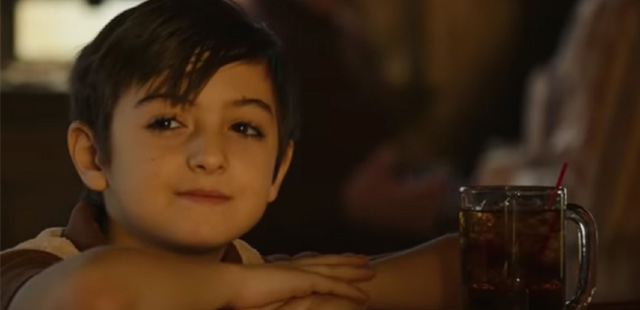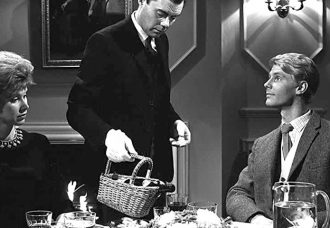The Tender Bar (2021) is an autobiographical coming of age movie of memoir writer J.R. Moehringer, directed by George Clooney. It follows the first half of the author’s life from his turbulent childhood at his grandfather’s house to his Yale days and short-lived stint at The New York Times. Child actor Daniel Ranieri who plays young JR does an impressive job despite ‘The Tender Bar’ being his first acting credit. Ben Affleck is the charismatic Uncle Charlie with Lily Rabe being cast in the role of JR’s single mother. Meanwhile, Christopher Lloyd keeps the mood light as the Grandpa in an otherwise sardonic plot.
As expected from the autobiography of a writer, we get a lyrical narration about JR’s disturbed family, the hardships faced by his single mother and the peace he finds at The Dickens, his Uncle Charlie’s bar. And while everyone in the family despises everyone, they begrudgingly take care of each other like the doddering Grandpa who shows off his soft spot when he accompanies a fatherless JR to a ‘father-son day’ at school. Charlie on the other hand is the real father figure who is gruff and honest. But he too has a tender side as he guides JR on how to be a man. The regular patrons also fill in the void of a father with their colorful experiences to the extent that JR is never left wanting one.
While the Mom hopes that JR goes to Yale and becomes a lawyer so that they don’t have to struggle anymore, it is Charlie who plants the idea of writing. While he isn’t educated he can hold his own in any discussion whether it is putting a rude psychotherapist in his place or discussing literary authors like Orwell, Dickens or Aquinas. The very concept of his uncle owning a Dickens-themed bar is what makes JR want to become a writer in the first place.
While we mostly spend our time with the charming Uncle Charlie, we do get a glimpse of ‘The Voice’, the absent father that JR mainly knows through the radio and the telephone that influences the young kid however hard he tries to stay apathetic, from giving his father constant chances to subconsciously taking on some of his traits. The radio jockey of a father also acts as a punching bag for JR and his family as it results in the sarcasm and dry humor that keeps the film from falling into a downward spiral of the lower class American destitution. We get some gems like Uncle Charlie assuring JR that his father would not kidnap him as it would come with responsibilities.
And that’s when the viewer realizes that the first half of the film goes back and forth between JR going for his Yale interview while reminiscing about his childhood. However, Clooney abandons this non-linear storytelling in the second half of the film after he is done with JR’s childhood which leads to a sense of emptiness as he chooses to rush through the protagonist’s college days and first job at The Times before he found his place as a celebrated journalist and memoir writer.
We go on to see a cynical and jaded JR who replaces his young and delightful counterpart as he gets an existential crisis in Yale, ends up in a harrowing copyboy position in The Times and his on and off relationship with Sidney, his first love that grounds him in his search for a purpose and identity. After a heated exchange with his father who he tries to give one last chance, JR frees himself from his Mom, Uncle Charlie, the bar patrons ‘The Voice’ and Sidney. As the aspiring writer leaves his old life behind the film ends with one last optimistic flashback of young JR driving with the bar patrons and Charlie for a free-spirited day at the beach.
The Tender Bar is technically well-made with scenic cinematography, a sepia-toned mood that complements the bars of the 70s and 80s, and laidback editing that suits the atmosphere of the south of USA. The crisp dialogues and skilful use of music which symbolizes the absent DJ father’s unintentional influence is additional support. The actors do well with their roles with Ranieri stealing the show as the young JR. He channels the real J.R.’s mature vibe and old-school spirit with his soulful eyes that has everyone sympathizing with him. Clever close-ups of young JR with his big sad brown eyes melt even the coarsest of hearts. Lily Rabe is a good actress that is wasted as she is simply the emotional and nervous wreck of a mother that symbolizes JR’s hardships. Tye Sheridan is the older JR whose dry expressions and glib delivery of dialogues lightens his otherwise pessimistic role as he is disillusioned with life.
But the script lets you down, especially with J.R.’s involvement as executive producer. With a brilliant memoir that has such lucid and fluid language when adapted to a screenplay, one has to edit and make changes as cinema is a visual representation of JR’s experiences rather than a faithful transference of text to audiovisual. Chasing his obsession with Sidney further pulls down the film and its strong first half.
Unfortunately, another glaring blunder in the storyline is once again with the introduction of Sidney, JR’s girlfriend who takes away from the otherwise picaresque of a film. In fear of today’s cancel culture, many often mistake the need for diversity with token representation without looking at the social context.
Hence creating a strong and empowered Black woman who toys with a White man who is raised in a Southern family in the 70s, only a couple of years after the Civil Rights Movement falls short. While the production tries to keep the supporting cast diverse like Wesley, JR’s Black roommate, for the sake of ‘wokeness’, his real White girlfriend, Sidney is played by African-American actress Briana Middlestone. Even though they meet in the early 1980s, The Tender Bar gets daring by making Sidney flippant about cheating on JR and dropping him without fear of lynching or racially-motivated harassment. It further gets audacious as the film fictionalizes the scene where JR meets her family with her mother looking down on him and being openly rude. It feels especially inauthentic since JR is a sturdy White male who does come from a sexist family and while racism is not addressed in The Tender Bar, the South has been known for having a racist mindset for a long time with some pockets of society still being racist in this day and age.
IMDB link of The Tender Bar








